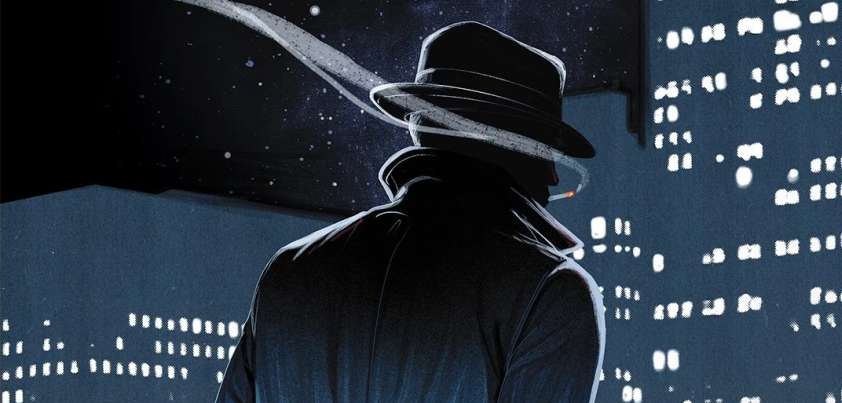 The Latin phrase used as the title of this story by Frederic Max gives away a little about the plot. Rex Ex Machina translates as King from Machine. The story comprises a letter from a dying man to his only son. There is nothing at all sentimental about the letter… the word “love” isn’t even mentioned! Rather, it explains something that the man has been hiding from his son for almost forty years. It tells how he had once trained as a spy and been sent on a top-secret mission to destroy a machine that threatened the free world. More…
The Latin phrase used as the title of this story by Frederic Max gives away a little about the plot. Rex Ex Machina translates as King from Machine. The story comprises a letter from a dying man to his only son. There is nothing at all sentimental about the letter… the word “love” isn’t even mentioned! Rather, it explains something that the man has been hiding from his son for almost forty years. It tells how he had once trained as a spy and been sent on a top-secret mission to destroy a machine that threatened the free world. More…
Archives
The Birthmark
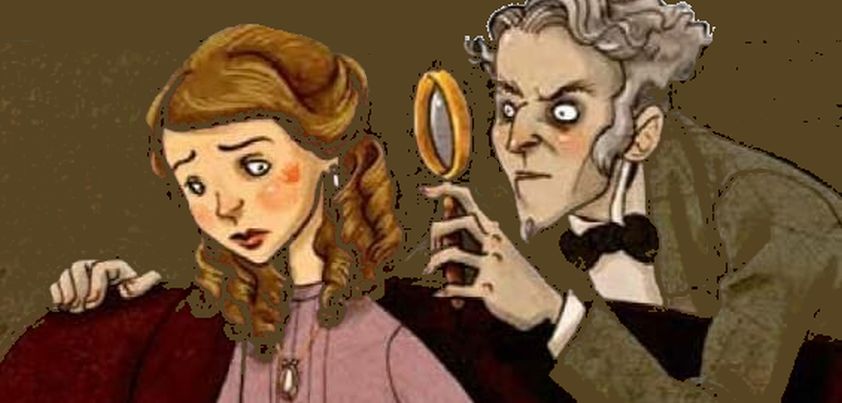 In this story by Nathaniel Hawthorne, a brilliant scientist takes a break from his work to marry a woman of nearly perfect beauty. Her one “blemish” is a small hand-shaped birthmark on her left cheek. Much of the scientist’s work has involved (often unsuccessfully) trying to manipulate the laws of Nature. As he begins to obsess over the frightful birthmark, his wife agrees to allow him to remove it… even if it costs her life! The story’s message: the folly of pursuing human perfection; no one is flawless. Themes: perfection, obsession, hubris, religion, gender roles, submission/sacrifice, science vs. nature, mortality. More…
In this story by Nathaniel Hawthorne, a brilliant scientist takes a break from his work to marry a woman of nearly perfect beauty. Her one “blemish” is a small hand-shaped birthmark on her left cheek. Much of the scientist’s work has involved (often unsuccessfully) trying to manipulate the laws of Nature. As he begins to obsess over the frightful birthmark, his wife agrees to allow him to remove it… even if it costs her life! The story’s message: the folly of pursuing human perfection; no one is flawless. Themes: perfection, obsession, hubris, religion, gender roles, submission/sacrifice, science vs. nature, mortality. More…
The Star
 In Arthur C. Clarke’s The Star, a manned spaceship travels to the edge of the galaxy to explore a nebula (cloud of interstellar gas) surrounding a collapsed star. Within the nebula is a burnt out planet that miraculously survived the explosion. On the planet is a huge stone marker left by a highly advanced civilization that did not survive. Under the marker, buried deep inside the planet, is a vault containing the civilization’s secrets. Among these is a disturbing discovery that challenges our traditional concepts of God. Themes: religious faith, science vs. religion, humankind as the center of the universe. More…
In Arthur C. Clarke’s The Star, a manned spaceship travels to the edge of the galaxy to explore a nebula (cloud of interstellar gas) surrounding a collapsed star. Within the nebula is a burnt out planet that miraculously survived the explosion. On the planet is a huge stone marker left by a highly advanced civilization that did not survive. Under the marker, buried deep inside the planet, is a vault containing the civilization’s secrets. Among these is a disturbing discovery that challenges our traditional concepts of God. Themes: religious faith, science vs. religion, humankind as the center of the universe. More…
The Fun They Had
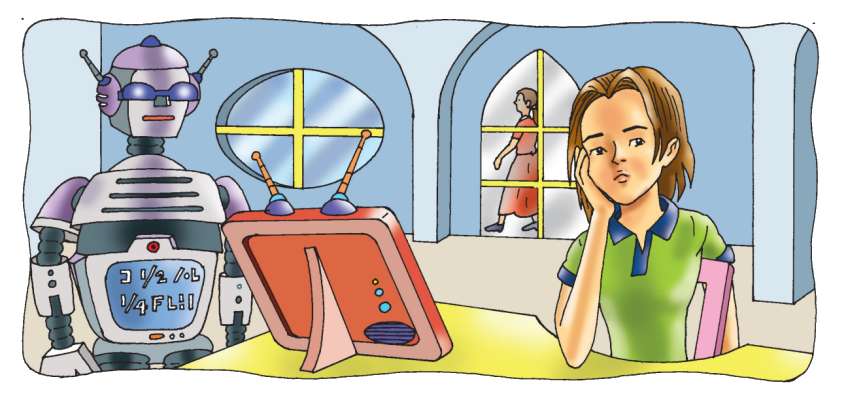 This story by Isaac Asimov is set in the year 2155. The theme is one that many of today’s children experienced for the first time during recent Covid-19 lock-downs: on-line learning from home. In the story, a boy shows a friend something strange he found hidden away in his family attic. Neither of them has seen one before… it is a book! First, they discuss how wasteful paper books were compared to electronic books of their day. The book is about school, and they go on to compare home schooling of the future with “going to school” in the past. More…
This story by Isaac Asimov is set in the year 2155. The theme is one that many of today’s children experienced for the first time during recent Covid-19 lock-downs: on-line learning from home. In the story, a boy shows a friend something strange he found hidden away in his family attic. Neither of them has seen one before… it is a book! First, they discuss how wasteful paper books were compared to electronic books of their day. The book is about school, and they go on to compare home schooling of the future with “going to school” in the past. More…
All Summer in a Day
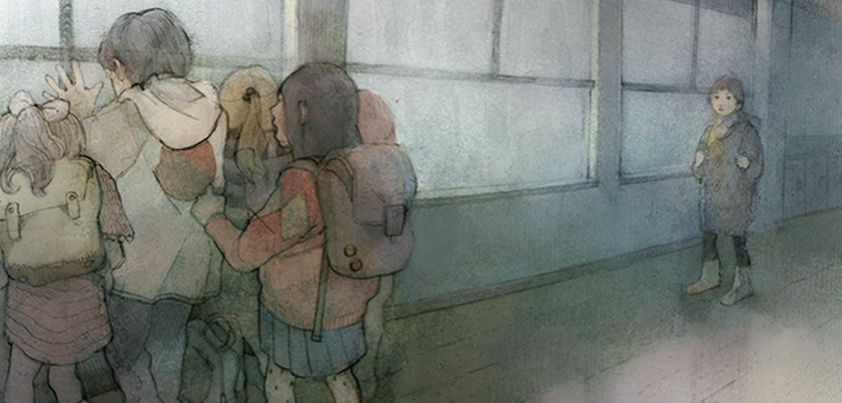 Several of Science Fiction writer Ray Bradbury‘s best-known stories feature rain as a major background element. The climate in this story, set on the planet Venus, features almost constant rain. The only break comes every seven years, when there are two hours of sunshine. The children of the Earth space travel families on the planet are all looking forward to playing outside during the short break. Only one of them has ever seen the sun, and she is having great trouble dealing with the constant rain. But when the sun finally does come out, she is nowhere to be seen. More…
Several of Science Fiction writer Ray Bradbury‘s best-known stories feature rain as a major background element. The climate in this story, set on the planet Venus, features almost constant rain. The only break comes every seven years, when there are two hours of sunshine. The children of the Earth space travel families on the planet are all looking forward to playing outside during the short break. Only one of them has ever seen the sun, and she is having great trouble dealing with the constant rain. But when the sun finally does come out, she is nowhere to be seen. More…
Answer
 A goodreads.com reviewer aptly describes Answer by Fredric Brown as one of the most concise SciFi horror stories I have ever read. There are eerie similarities between the new supercomputer’s response to the first question asked of it in this story and the final sentence of Isaac Asimov’s The Last Question. Both stories were published in the mid-1950s and reflect concerns about the future influence of computers on society. An interesting observation on some other websites is that Brown’s one cybernetics machine that would combine all the knowledge of all the galaxies is already here… it’s called the Internet! More…
A goodreads.com reviewer aptly describes Answer by Fredric Brown as one of the most concise SciFi horror stories I have ever read. There are eerie similarities between the new supercomputer’s response to the first question asked of it in this story and the final sentence of Isaac Asimov’s The Last Question. Both stories were published in the mid-1950s and reflect concerns about the future influence of computers on society. An interesting observation on some other websites is that Brown’s one cybernetics machine that would combine all the knowledge of all the galaxies is already here… it’s called the Internet! More…
The Pedestrian
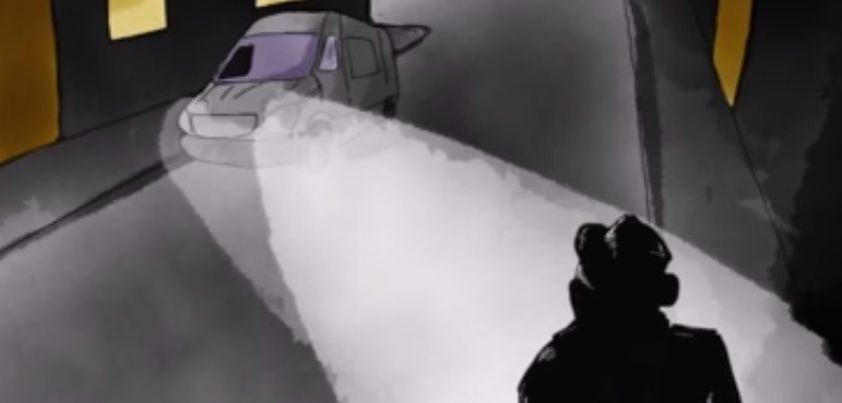 This is our second Ray Bradbury story that questions the social effects of television (the first being The Veldt). Set in 2053, almost everyone stays indoors all night watching TV. Leonard Mead doesn’t. He enjoys going out for a long walk every evening. This is so unusual that he comes to the attention of police. Fortunately, Bradbury’s predictions about TV were wrong. Other than people binge watching streamed content when there are better things they could be doing, TV has proved to be relatively harmless. However, something far more dangerous may be replacing it: social networking on mobile devices! More…
This is our second Ray Bradbury story that questions the social effects of television (the first being The Veldt). Set in 2053, almost everyone stays indoors all night watching TV. Leonard Mead doesn’t. He enjoys going out for a long walk every evening. This is so unusual that he comes to the attention of police. Fortunately, Bradbury’s predictions about TV were wrong. Other than people binge watching streamed content when there are better things they could be doing, TV has proved to be relatively harmless. However, something far more dangerous may be replacing it: social networking on mobile devices! More…
Bloodchild
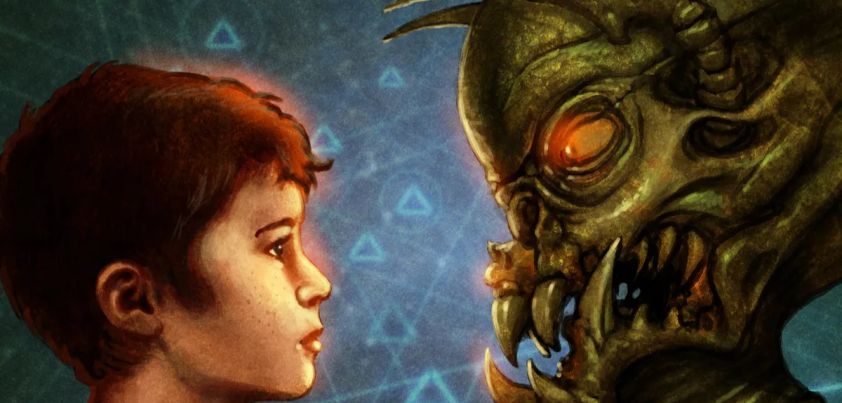 Octavia Butler described this as her “pregnant man” story. A colony of humans fleeing some kind of trouble takes shelter on a planet inhabited by giant, insect-like beings. The insects (Tlics) develop a symbiotic relationship with the humans (Terrans). In exchange for protection, adolescent boys are allocated to Tlic families, where they must incubate a Tlic mother’s eggs. The eggs are implanted in their abdomen, necessitating a rather gruesome but usually successful delivery process. Understandably, the Terran protagonist who has just reached maturity is having second thoughts about this. Themes: exploitation vs. interdependence, gender roles, fear, sacrifice vs. jealousy, love. More…
Octavia Butler described this as her “pregnant man” story. A colony of humans fleeing some kind of trouble takes shelter on a planet inhabited by giant, insect-like beings. The insects (Tlics) develop a symbiotic relationship with the humans (Terrans). In exchange for protection, adolescent boys are allocated to Tlic families, where they must incubate a Tlic mother’s eggs. The eggs are implanted in their abdomen, necessitating a rather gruesome but usually successful delivery process. Understandably, the Terran protagonist who has just reached maturity is having second thoughts about this. Themes: exploitation vs. interdependence, gender roles, fear, sacrifice vs. jealousy, love. More…
Zero Hour
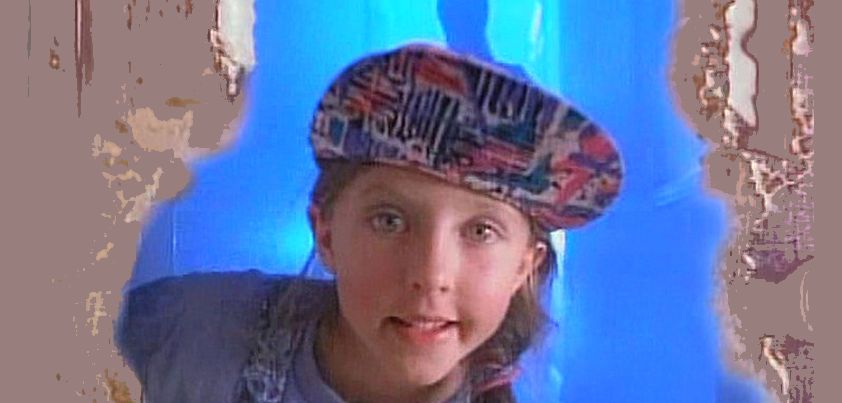 This chilling story by Ray Bradbury involves an inattentive mother, a feisty seven-year-old girl, and her imaginary friend Drill. Throughout most of the story, the girl leads her friends in a construction game following instructions she receives from Drill. Her mother later learns that groups of similar-aged children across America are playing the same game. Its name is “Invasion”, and for her the climax comes in a single word: Peekaboo. The major theme of the story is complacency. The mother senses something is wrong, but doesn’t act until too late. Other themes: human smugness (We’re impregnable!), child innocence/impressionability, manipulation/reward, violence. More…
This chilling story by Ray Bradbury involves an inattentive mother, a feisty seven-year-old girl, and her imaginary friend Drill. Throughout most of the story, the girl leads her friends in a construction game following instructions she receives from Drill. Her mother later learns that groups of similar-aged children across America are playing the same game. Its name is “Invasion”, and for her the climax comes in a single word: Peekaboo. The major theme of the story is complacency. The mother senses something is wrong, but doesn’t act until too late. Other themes: human smugness (We’re impregnable!), child innocence/impressionability, manipulation/reward, violence. More…
LAFFF
 The Asian-American protagonist in this story by Lensey Namioka desperately wants to impress her parents by winning the Best Story Award for her grade in her school’s annual writing competition. Meanwhile, a nerdy classmate and neighbor has developed a time machine in his garage. She is the only one who knows about it and, when she can’t come up with a story she is happy with, she decides to travel forward in time to copy the winning entry. Her major concern is coming face-to-face with herself! Themes include pressure to succeed, friendship, time travel, cheating. More…
The Asian-American protagonist in this story by Lensey Namioka desperately wants to impress her parents by winning the Best Story Award for her grade in her school’s annual writing competition. Meanwhile, a nerdy classmate and neighbor has developed a time machine in his garage. She is the only one who knows about it and, when she can’t come up with a story she is happy with, she decides to travel forward in time to copy the winning entry. Her major concern is coming face-to-face with herself! Themes include pressure to succeed, friendship, time travel, cheating. More…
The Last Night of the World
 This Ray Bradbury story opens with a question: What would you do if you knew this was the last night of the world? A couple believe the world will end sometime during the coming night. The idea came in a dream. They and everyone they know shared the same dream. The couple decide the best thing to do is accept the fact and go through their evening routine as usual. They even manage to share a joke and go to bed laughing. What would you do? Themes: family, powerlessness, acceptance of the “inevitable”, comfort in routine, selfishness vs. global concern. More…
This Ray Bradbury story opens with a question: What would you do if you knew this was the last night of the world? A couple believe the world will end sometime during the coming night. The idea came in a dream. They and everyone they know shared the same dream. The couple decide the best thing to do is accept the fact and go through their evening routine as usual. They even manage to share a joke and go to bed laughing. What would you do? Themes: family, powerlessness, acceptance of the “inevitable”, comfort in routine, selfishness vs. global concern. More…
The Machine That Won the War
 This story by Isaac Asimov remains relevant today as technology plays an increasing role in controlling everything from military applications to crucial infrastructure. The main theme is the danger of placing blind faith in either machine or human decision-making. Ironically, the war wasn’t won by Multivac or any of the three ‘experts’. It was won either by chance or because of problems experienced by the enemy. Pointedly, no thought is given to the rights and wrongs of the war or the suffering on both sides. Earth has won. Basking in the glory, this is all the three men care about! More…
This story by Isaac Asimov remains relevant today as technology plays an increasing role in controlling everything from military applications to crucial infrastructure. The main theme is the danger of placing blind faith in either machine or human decision-making. Ironically, the war wasn’t won by Multivac or any of the three ‘experts’. It was won either by chance or because of problems experienced by the enemy. Pointedly, no thought is given to the rights and wrongs of the war or the suffering on both sides. Earth has won. Basking in the glory, this is all the three men care about! More…
I Have No Mouth and I Must Scream
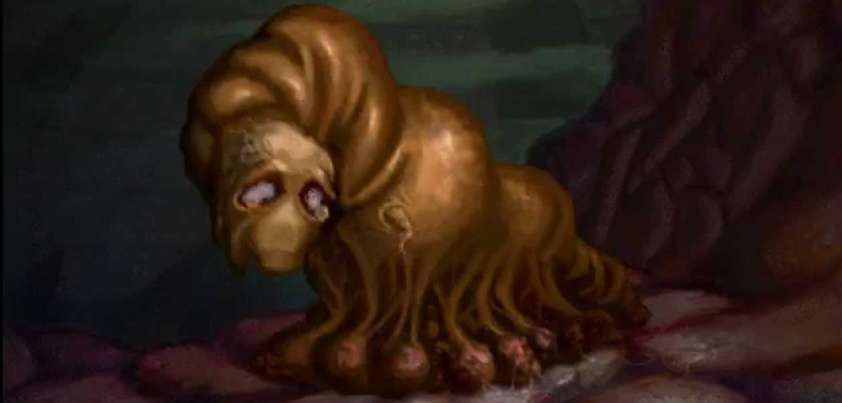 This story from Harlan Ellison is an example of New Wave Science Fiction, a literary movement that flourished in the 1960s and 1970s. Distinguishing features are storylines that are intellectually implausible, and disturbing themes that would not normally be included in traditional science fiction. A sentient supercomputer has destroyed the human race other than five ‘specimens’. With no creative outlet for its powers, it has kept these alive and subjected them to torturous challenges for over one hundred years as revenge against humanity for creating it. Themes: humanity vs. technology, godhood, individualism, revenge, cruelty, violence, misogyny, self-sacrifice More…
This story from Harlan Ellison is an example of New Wave Science Fiction, a literary movement that flourished in the 1960s and 1970s. Distinguishing features are storylines that are intellectually implausible, and disturbing themes that would not normally be included in traditional science fiction. A sentient supercomputer has destroyed the human race other than five ‘specimens’. With no creative outlet for its powers, it has kept these alive and subjected them to torturous challenges for over one hundred years as revenge against humanity for creating it. Themes: humanity vs. technology, godhood, individualism, revenge, cruelty, violence, misogyny, self-sacrifice More…
They’re Made Out Of Meat
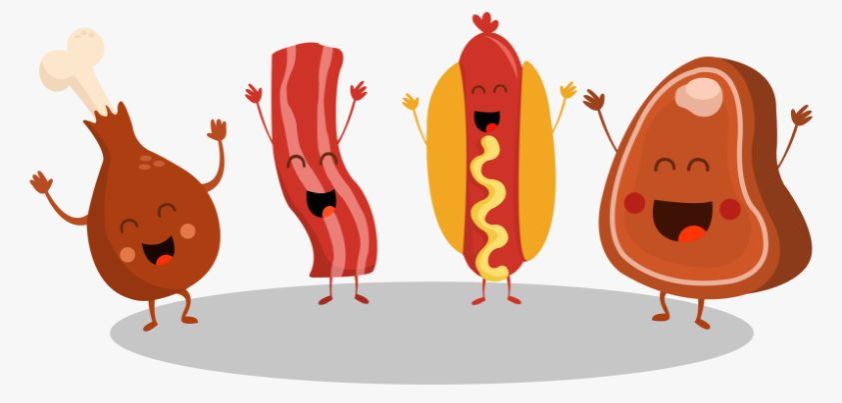 At first read, this very short story by Terry Bisson appears to be a humorous exchange with little substance. Two alien space explorers are discussing whether to make contact with a newly discovered intelligent life form. They are uneasy about it because the life form seems to be composed entirely of meat. The major theme of the story is prejudice: the aliens consider themselves above all other life. How can beings so different to them be capable of such advanced thought? Also, an interesting dietary theme: Is it right that one sentient life form (man) kills and eats others (animals)? More…
At first read, this very short story by Terry Bisson appears to be a humorous exchange with little substance. Two alien space explorers are discussing whether to make contact with a newly discovered intelligent life form. They are uneasy about it because the life form seems to be composed entirely of meat. The major theme of the story is prejudice: the aliens consider themselves above all other life. How can beings so different to them be capable of such advanced thought? Also, an interesting dietary theme: Is it right that one sentient life form (man) kills and eats others (animals)? More…
Flowers for Algernon
 This touching short story from Daniel Keyes is about a mentally handicapped man who undergoes experimental surgery to enhance his intelligence. The operation’s initial success highlights an interesting aspect of intelligence: the very gifted can be as out of touch with reality and friendless as the intellectually challenged. The story raises an important issue: How far should medical science go in tampering with nature or, as some would say, the will of God? Perhaps the answer lies in Charlie’s ultimate fate, ironically going backwards in intelligence rather than forwards. Other themes include innocence, friendship, compassion, bullying and sacrifice. More…
This touching short story from Daniel Keyes is about a mentally handicapped man who undergoes experimental surgery to enhance his intelligence. The operation’s initial success highlights an interesting aspect of intelligence: the very gifted can be as out of touch with reality and friendless as the intellectually challenged. The story raises an important issue: How far should medical science go in tampering with nature or, as some would say, the will of God? Perhaps the answer lies in Charlie’s ultimate fate, ironically going backwards in intelligence rather than forwards. Other themes include innocence, friendship, compassion, bullying and sacrifice. More…
Key Item
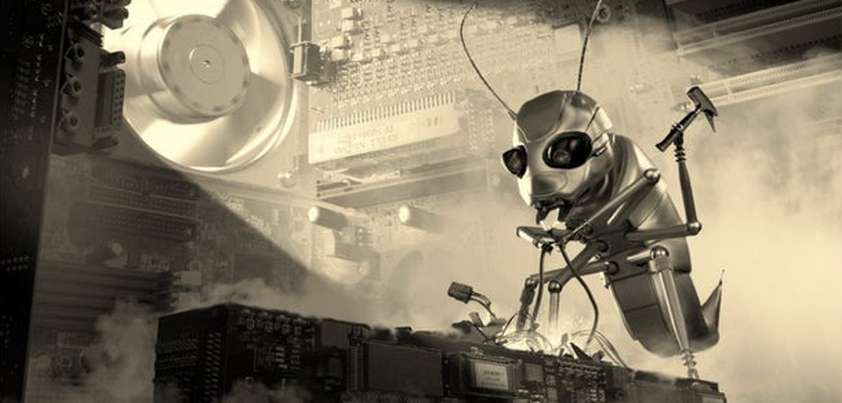 Some time ago we featured a story about how Multivac, Isaac Asimov’s favorite supercomputer, was NOT The Machine That Won the War. In this Asimov story, Multivac has problems. It does not respond to commands, and isn’t following its built-in program to self-diagnose the cause. As the global economy depends on Mulitvac, this could result in panic across the world. Teams of technicians have been trying to identify what is wrong for three days. Finally, a scientist discovers the “key item” needed to fix the problem. It is a simple thing that we are all taught to use as children. More…
Some time ago we featured a story about how Multivac, Isaac Asimov’s favorite supercomputer, was NOT The Machine That Won the War. In this Asimov story, Multivac has problems. It does not respond to commands, and isn’t following its built-in program to self-diagnose the cause. As the global economy depends on Mulitvac, this could result in panic across the world. Teams of technicians have been trying to identify what is wrong for three days. Finally, a scientist discovers the “key item” needed to fix the problem. It is a simple thing that we are all taught to use as children. More…
Harrison Bergeron
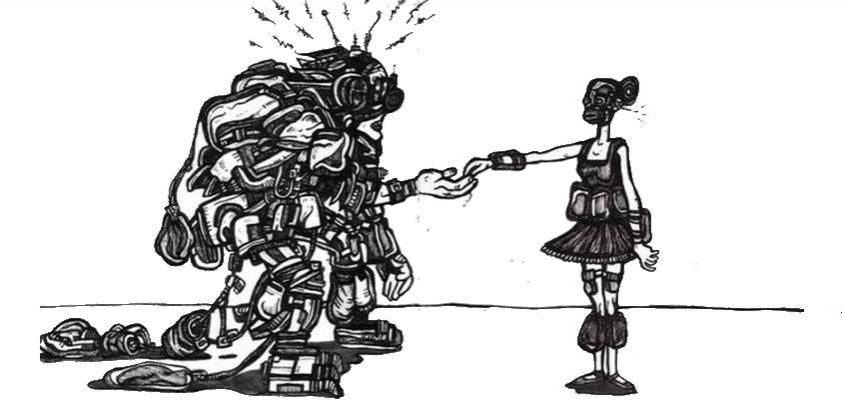 This story by science-fiction writer Kurt Vonnegut is about a future world in which the government tries to make everyone equal. The strong must carry heavy weights, the beautiful must wear masks, and the clever are subjected to distracting sounds to stop them thinking clearly. As is usual in totalitarian worlds, those in power are excused from all this… especially the Handicapper General and her “H-G” men. A powerful, gifted fourteen-year-old boy tries to change things as his parents watch on in confusion. Themes: control (forced conformity through oppression and violence), identity (equality vs. individuality), rebellion, media power. More…
This story by science-fiction writer Kurt Vonnegut is about a future world in which the government tries to make everyone equal. The strong must carry heavy weights, the beautiful must wear masks, and the clever are subjected to distracting sounds to stop them thinking clearly. As is usual in totalitarian worlds, those in power are excused from all this… especially the Handicapper General and her “H-G” men. A powerful, gifted fourteen-year-old boy tries to change things as his parents watch on in confusion. Themes: control (forced conformity through oppression and violence), identity (equality vs. individuality), rebellion, media power. More…
The Veldt
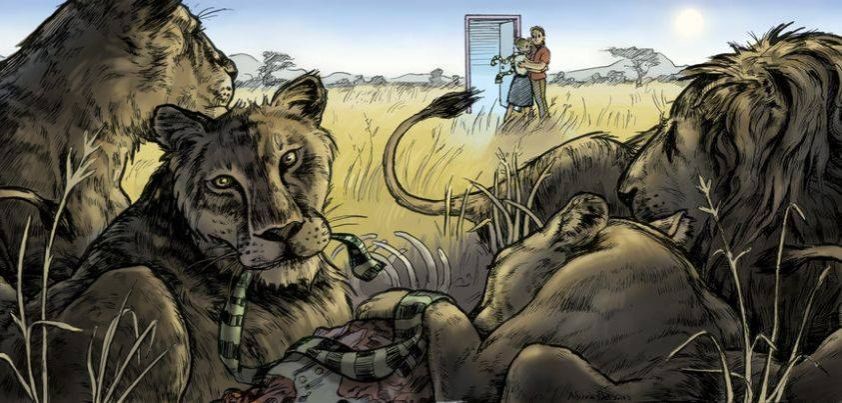 In this chilling story by Ray Bradbury, frantic parents who try to rein in their spoiled children by shutting down the hi-tech games room in their “HappyLife” home become a “HappyMeal”. Although written in 1950 to question the rising influence of television, the story serves as a warning to modern parents who let their children build their lives around social networking and/or game play. The story’s major theme is the alienation, dehumanization, breakdown of family values that can arise in a household through over-reliance on technology. Other themes: consumerism, poor parenting, illusion vs. reality, dystopia. More…
In this chilling story by Ray Bradbury, frantic parents who try to rein in their spoiled children by shutting down the hi-tech games room in their “HappyLife” home become a “HappyMeal”. Although written in 1950 to question the rising influence of television, the story serves as a warning to modern parents who let their children build their lives around social networking and/or game play. The story’s major theme is the alienation, dehumanization, breakdown of family values that can arise in a household through over-reliance on technology. Other themes: consumerism, poor parenting, illusion vs. reality, dystopia. More…
Earthmen Bearing Gifts
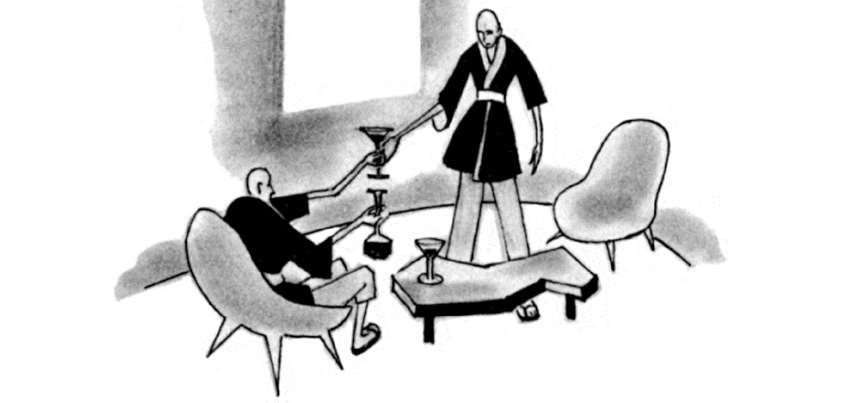 In this sardonic science-fiction story by Fredrick Brown, the people of Mars are looking forward to their first ever visit from Earth. The planets have long planned an exchange of gifts. Each civilization is more advanced in an important area of science. Martians have mastered the para-psychological sciences. They can teach Earthmen how to avoid crime and war through telepathy, telekinesis and empathy. The Earth has made greater progress in technology and the physical sciences. This could help the Martians restore their dying planet. Earth’s first “gift”, delivered in an unmanned spacecraft, is not what the Martians expected. Theme: betrayal. More…
In this sardonic science-fiction story by Fredrick Brown, the people of Mars are looking forward to their first ever visit from Earth. The planets have long planned an exchange of gifts. Each civilization is more advanced in an important area of science. Martians have mastered the para-psychological sciences. They can teach Earthmen how to avoid crime and war through telepathy, telekinesis and empathy. The Earth has made greater progress in technology and the physical sciences. This could help the Martians restore their dying planet. Earth’s first “gift”, delivered in an unmanned spacecraft, is not what the Martians expected. Theme: betrayal. More…
Reunion
 This story by Arthur C. Clarke packs a powerful message into just two pages. It takes the form of a radio message reassuring the people of Earth that they have nothing to fear from a group of beings approaching from space. The visitors claim to share a common ancestry with man, both being descended from an advanced race of aliens who colonized Earth during the time of the dinosaurs. Those who could fled when a terrible genetic plague brought on division, conflict and savagery among the population. They are returning with a cure for any who might still be affected. More…
This story by Arthur C. Clarke packs a powerful message into just two pages. It takes the form of a radio message reassuring the people of Earth that they have nothing to fear from a group of beings approaching from space. The visitors claim to share a common ancestry with man, both being descended from an advanced race of aliens who colonized Earth during the time of the dinosaurs. Those who could fled when a terrible genetic plague brought on division, conflict and savagery among the population. They are returning with a cure for any who might still be affected. More…